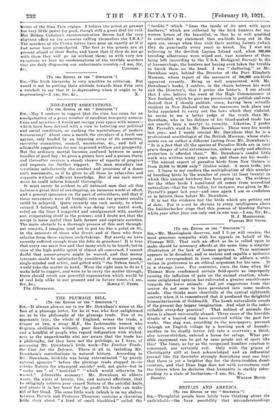THE PLUMAGE BILL.
[To THE EDITOR OF THE " SPECTATOR."] B1R,—It always pleases me to see Mr. Downham's name at the foot of a plumage letter, for he it was who first enlightened me as to the philosophy of the plumage trade. Few of its opponents (viz., the whole of England, minus the trade, a draper or two, a stray M.P., the fashionable women who disgrace civilization without, poor dears, even knowing it, and a handful of people who regard indignation with wicked- ness as the unpardonable sin) are aware that the trade has a philosophy, for they have not the privilege, as I have, of possessing Mr. Downham's little work—The Feather Trade: the Case for the Defence. There it all is, including Mr. Downham's contributions to natural history. According to Mr. Downham, bird-life was being exterminated "by purely natural agencies " before the plumage trade stepped in—to rebuke Nature for attempted suicide? well, not quite—but to " make use " of "material " " which would otherwise be wasted." Admirable economy! Mr. Downham so abhors waste, the waste of beauty, life, and natural affections, that he obligingly relieves poor crazed Nature of the suicidal knife, and plants it in her heart for the profit his trade can make out of her blood. The same little work (which is on my shelves between Darwin and Professor Thomson) contains a charming little story about "a kind of small blackbird" called the "tordito " which "lines the inside of its nest with egret feathers,". which are collected by • the bird hunters for our women lovers of the beautiful, so that he is well qualified to contradict my statement that sea-birds keep out in the open sea, except when they visit their nesting-haunts .(which they do punctually every year) to breed. No, I was not referring to the devilish Laysan Island raid, when 300,000 breeding albatrosses were wiped out, vast numbers of them being left (according to the U.S.A. Biological Survey) to the of haemorrhage, the hunters not having even taken the trouble to knock them on the head. I was " sheltering," as Mr. Downham says, behind the Director of the Port Elizabeth Museum, whose report of the massacre of 200,000 sea-birds appeared recently. Being so well acquainted with , Mr. Downham's books, I confess, in the choice between his word and the Director's, that I prefer the latter's. I am afraid that I also believe the word of the High Commissioner of New Zealand, which he gave me permission to publish and even desired that I should publish, since, having been actually resident in New Zealand when the massacres took. place and being appointed to carry out the laws which they violated, he seems to me a better judge of the truth than Mr. Downham, who in his defence of his blood-soaked trade has not exactly been a martyr to veracity. Likewise, I prefer Mr. Pycraft's word to Mr. Downham's. These were his words last year, and I would remind Mr. Downham that he is a professional ornithologist of the. British Museum, whose state- ments are on rather a different footing from Mr. Downham's: " It is a fact that all the species of Paradise Birds are in very grave danger of total extermination, unless speedy and effectiie protection is afforded them." Mr. Downham's candid little work was written many years ago, and these are his words : " The annual export of paradise birds from New Guinea is from 25,000 to 30,000 only" (italics mine). A mere trifle, you see. I leave to my readers the multiplication of this number of breeding birds by the number of years (at least twenty) in which this annual butchery has been going on. The evidence for the other birds I mentioned all oomes from accredited naturalists—that for the todies, for instance, was given in Mr. Pycraft's paper last year—and once again I am so credulous as to believe them before Mr. Downham.
It is not the evidence but the birds which are getting out of date. For it must be obvious to every intelligence above the knickerbocker stage that this process of bleeding Nature white year after year can only end in one way.—I am, Sir, &c., B. J. MASSINOHAM, Plumage Bill Group.


































 Previous page
Previous page